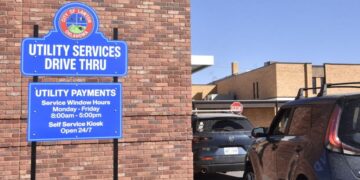Cryptocurrency mining will become legal in the Lawton city limits Nov. 1, with special circumstances that include assurances that the power grid can support the high-electrical-use activity.
City Council members made the decision Tuesday, saying they were getting ahead of the effort that the Oklahoma State Legislature set in motion in May by approving regulations to allow digital asset mining in industrial-zoned areas effective Nov. 1. Lawton adopted similar guidelines that would go into effect the same day, but also opted to allow smaller businesses as home occupations in residentially-zoned areas.
Council action allows large operations (those consuming 1 megawatt of power or more) in I-1 Restricted Manufacturing and Warehouse District zones, and small operations (those using up to 1 megawatt of power) as home occupations in residential areas. Both ordinances come with definitions centered on digital assets, which means virtual currency, cryptocurrencies, natively electronic assets including stablecoins, and other digital-only assets that confer economic, proprietary or access rights or powers.
City Planner Christine James said interest in the activity was sparked by a call to the planning department, asking what zoning district would allow digital asset mining. The answer was none: Lawton’s zoning codes don’t address the issue — or didn’t until council action Tuesday that will add those uses and definition to code in less than two months.
“It gets us ahead of the game,” James said.
City planners have said Lawton would be among the first cities in Oklahoma to allow that use under a city zoning code. None of Lawton’s peer cities allow it, planners said.
The issue for many people is the intense concentration of heat that the banked computers associated with digital asset mining use, coupled with the tremendous amount of electrical power that is pulled. City Attorney John Andrew, explaining the issue to the council, said the tremendous use of electricity can generate “quite a bit of heat.” Those concerns are why the City Planning Commission recommended a provision to require home occupations to submit to annual inspections by the fire marshal, to ensure structures can handle the amount of electricity being pulled. Commissioners said they were concerned about fire dangers that may be posed by overloading a house’s circuits.
Ward 4 Councilman George Gill provided the amendment to help address some of those concerns, specifying that before a digital asset mining applicant can be registered, it must provide an assurance from the local electricity provider there is enough infrastructure to support electrical needs at that specific location. The provision is included in both the industrial and home occupation uses, council members decided.
A gigawatt is equivalent to the average electrical usage of 600 households, city officials said.
Commissioners also were concerned about the noise level of such businesses, and city code specifies home occupation use must adhere to all noise ordinances in neighborhoods.
Want to reach a local audience and grow your business?
Our website is the perfect platform to connect with engaged readers in your local area.
Whether you're looking for banner ads, sponsored content, or custom promotions, we can tailor a package to meet your needs.
Contact us today to learn more about advertising opportunities!
CONTACT US NOW





